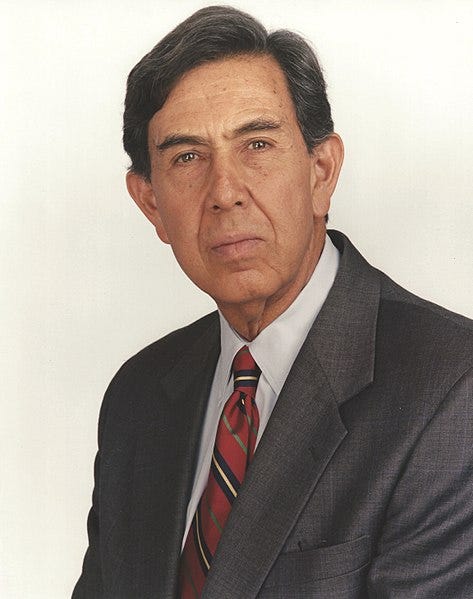
Cuauhtémoc Cárdenas Solórzano (b. 1934) is a Mexican politician and civil engineer who served as the first democratically-elected Head of Government of Mexico City Cárdenas is also the founder of the Party of the Democratic Revolution (PRD), a social democratic political party that formed in 1989.
Beneath the Shadow of a President
Cárdenas is the only son of President Lázaro Cárdenas (1934 - 1940), who is often regarded as one of Mexico’s greatest presidents of all time for his socialist reforms and policies. Influenced by his father’s ideology, Cuauhtémoc would champion the ideas of social justice and political reform. During his early years in politics, Cárdenas, who was acting as an aide-de-camp for his father, had unsuccessfully attempted to steer the Institutional Revolutionary Party (PRI) toward a leftward and democratic trajectory, primarily in response to the party’s authoritarian history and rightward shift in the 1970s and 1980s. Ultimately, when Carlos Salinas de Gortari was named as the successor of the PRI in 1987, Cárdenas had rallied all leftists within the PRI to splinter away, and ran for president under the National Democratic Front (FDN) in 1988.
Cárdenas’ Democratic Revolution
By 1988, the PRI still had a heavy hand throughout Mexico. Going against the big-tent leviathan was lethal, and winning against them was impossible, but Cárdenas held hope in his democratic movement. On election day, Salinas de Gortari got 50% of the vote, while Cárdenas got 31%. However, that night, many polling sites had indicated that Cárdenas was leading the election, yet at the last minute, the PRI claimed a large victory. To this day, Cárdenas and his supporters believe that the election was fraudulent, and as a result, Cárdenas formed the PRD. Though the party has yet to claim a presidential victory, the party paved the path for a strong leftist opposition to grow in Mexico, which was seen primarily on a local level.
Cárdenas’ Key Principles of Democracy
Free and fair elections: Cárdenas had been a victim of rigged elections, which is primarily the largest influence on his philosophy. In his eyes, a democracy must not be prone to interference and manipulation, and should strive to regulate such activities.
Inclusive democracy: Cárdenas believes that democracy is a means to address inequalities, and must prioritize social justice, economic equity, and uplifting marginalized communities.
Political pluralism: Cárdenas had strived for electoral reform to break up the one-party system under the PRI. In his eyes, an ideal democracy is one that allows several parties to have a stake in policy, which can efficiently represent a diverse range of voices.
Though Cárdenas and his PRD never gained notable power in Mexico, his legacy had established the future success of left-wing populist party MORENA. However, many of Cárdenas’ goals, like multi-party systems and free elections, have yet to be fulfilled.



